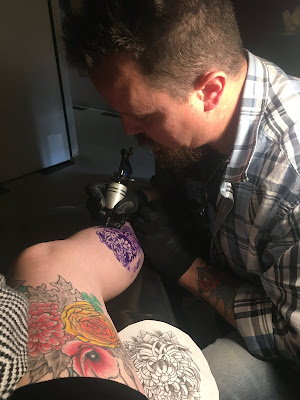Duke Haney released Death Valley Superstars last December with Delancy Street Press.
You can purchase a copy, and purchase a copy you should, here.
Btw, the Kindle version is just 1.99. I mean, seriously, go get the dang thing!
Though
its tone is sometimes comic, “Death Valley Superstars“ is nevertheless a livre
noir, and no liquor says noir to me like whisky, whether bourbon, scotch,
Irish, or Canadian. Steve Cochran, a noir figure both on- and offscreen and one
of the short-lived subjects of “Death Valley Superstars,” had a taste for
whisky, as did another of the book’s subjects, Jim
Morrison, who sang famously, “Oh, show me the
way to the next whisky bar,” while I once passed out on the floor of Morrison’s
bygone residence in West Hollywood after a night of drinking—what else?—whisky.
This incident, which includes a visit from Morrison’s ghost, is recounted in
”Death Valley Superstars,” but I’m afraid whisky is not typically sold
alongside the book.
~~~~~~~~~~~~~~~~~~~~~~~~~~~~~~~~~~~~~~~~~~~~~~~~
“If it goes by, I’ve always known it was fickle,” Marilyn Monroe once said of fame, an overriding theme in this collection of essays, profiles, and memoir by showbiz survivor Duke Haney. Fame proved faithful, of course, to Monroe, the book’s most iconic subject, while others, like Steve Cochran, a villain in movies and a “hard-drinking, bed-hopping cop magnet” in reality, were widely forgotten before their untimely, often mysterious deaths. Taking an experimental tack in some instances, Haney employs a psychic medium to conduct a séance at Jim Morrison’s former residence and an astrologer to interpret the birth chart of an astrology-crazed film star-turned-bank robber. He attends the funeral of the “next James Dean” who became a raggedy street person, performs a cringeworthy nude scene in a movie produced by “King of the Bs” Roger Corman, and searches for the camper van where funk trailblazer Sly Stone has been reduced to living.
Painstakingly researched and compulsively readable, Death Valley Superstars offers a kind of midnight tour of Los Angeles past and present, highlighting hidden corridors and seldom-heard anecdotes about a few of the many who, fooled by Hollywood’s mirages, found themselves caught in its quicksand.
~~~~~~~~~~~~~~~~~~~~~~~~~~~~~~~~~~~~~~~~~~~~
"The book is brilliantly sequenced. If you’ve ever wanted to hear scalpel slices of backlot dreams … perhaps nightmares … or Gnosis remarks that refer to Las Vegas and Hollywood … then Duke Haney … with sly wit burning … with unknown and known old-school celebrities … certainly delivers." - Heavy Feather Review
"Haney has produced a fantastic, thoroughly readable book. His unique literary flair and his obvious passion and knowledge makes for a rich and interesting collection, no matter how much or how little you may know about the subject." - Storgy
"I was humbled and dazzled by Duke's writing. It's just so good....one I recommend regardless of whether one thinks they have an interest in mid to late 20th century Hollywood. It is well worth the read just to experience the immense talent of an extremely under-appreciated writer." - Jonathan Dunkle
"...we owe him our thanks for Death Valley Superstars, a dream of a collection." - LARB
" “Death Valley Superstars” forms a kind of homage to a grittier, pre-gentrified Hollywood." - AV Press
~~~~~~~~~~~~~~~~~~~~~~~~~~~~~~~~~~~~~~~~~~~~~~~~~~~
Duke Haney, aka Daryl Haney, has spent most of his
adult life working in the movie business, with twenty feature-film credits as
an actor and twenty-two as a screenwriter.
He used pseudonyms for some of the screenplays and went by “D. R. Haney”
as the author of a novel, Banned for Life,
and an essay collection, Subversia.
After he was struck by a car in a crosswalk on Sunset Boulevard, a friend claimed
he walked like John “Duke” Wayne and gave him the nickname by which most people
know him and he has taken belatedly as his pen name. He plans to follow Death Valley Superstars with a novel
tentatively titled XXX.






















